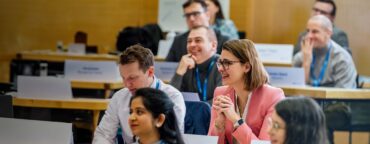
Not long ago, Søren Stig was a very worried man.
The COVID-19 crisis was quickly taking over Europe in March, and like his fellow Danes, Stig went into confinement. But rather than let fear overwhelm him, the IMD EMBA (2013) graduate decided to put his time and network to work on potential solutions.
“I felt frustrated and wanted to do my part in alleviating the crisis,” says Stig. “The situation called for creating something quickly and bringing it to scale.”
Almost immediately, one element of fighting the virus became very clear: testing. The process required an uncomfortable manual swab in the nose, mouth, or throat, by a doctor or nurse and was not only tedious, but dangerous due to the highly infectious nature of COVID-19.
“In order to properly diagnose and treat COVID-19, a safe, automatic test had to be developed,” says Stig. “We needed a technology that could properly swab a patient without putting the lives of our health care professionals at risk.”
No experience, no problem
Although he had no background in robotics – Stig spent two decades in the shipping industry – he set about engaging with those who did.
Robots are mother’s milk to the Mærsk Mc-Kinney Møller Institute at the University of Southern Denmark in Odense, which has the world’s most elite robotics research team In fact, the whole region is known as Robotics Alley for the more than 130 robotics companies with 3,900 employees that are located in its broad, flat plains.
At the Mærsk Mc-Kinney Møller Institute, professor Thiusius Rajeeth Savarimuthu had already begun working on a swab robot alongside Esben Østergaard, co-founder of Universal Robots and a legend in robotics start-ups. They quickly found common ground with Stig, and though lockdown prevented face-to-face meetings, they wasted no time.
Working from an existing industrial robot, the team transformed it into a one that performs swabs automatically.
The robot gently places a cotton swab in the patient’s mouth and secures a sample. It then packages it up in a clinical fashion and sends the sample off to the laboratory. The result is a fully automated test-taking process.
“This is an end-to-end solution that has the potential to transform testing,” explains Stig. “Not just for COVID-19, but for other viruses as well.”
The team spent a month working round-the-clock to develop the prototype.
Along with Esben Østergaard, it didn’t take long to secure investors; soon a Swedish impact foundation and the University of Southern Denmark were officially part of the venture.
“At the end of April, we built a commercial company – Lifeline Robotics – around the invention,” says Stig. “What’s incredible is that we did so without any of the co-founders actually meeting!”
With initial funding of $250,000, Lifeline Robotics has enough to cover 10 full-time staff. Additional funding is in place as it will require another month of intensive work to bring the robot to market, but this is where Stig’s experience really comes into play.
Stig honed his commercial acumen in nearly 20 years at Maersk, beginning as a management trainee and evolving into a high-level executive. But the height of his career, he decided to rethink his life and used a sabbatical to refocus. Stig took advantage of Maersk’s long-standing relationship with IMD and completed an EMBA in 2013.
“IMD showed me that the going down the traditional corporate path is not the only way to develop yourself as a person and leader,” explains Stig, noting that it gave him the courage to make his own way as an entrepreneur.
The robot heard round the world
Lifeline Robotics had its public launch on 27th May 2020, and news of its innovative testing robot quickly spread. Major media outlets picked up the story the company was inundated with interest and requests for its product.
The next four-week sprint will see the robot taken out of the lab and assigned to one of the 16 covered “testing tents” in Denmark. This will include partnership with the University Hospital, who will supervise the robot’s testing on live subjects.
“At the end of June, we’ll start to commercialize the product and put it into proper production,” says Stig. “Our goal is to ship out units across the world to anyone that has a need.”
That could include anywhere there is a need for intensive testing, like hospitals and health care centers. The units are fully mobile and can also be deployed to airports, elderly homes, cruise ship terminals and refugee camps, amongst other locations.
“Frequent testing could help keep the coronavirus under control and avoid similar outbreak situations,” reminds Stig.
Many countries are moving to “virus passport” procedures, in which travelling is allowed only with a negative COVID-19 test result. If this continues, Stig believes the need for proactive testing will increase dramatically until a vaccine has been developed.
“Proving you’re COVID-19-free is something we will all have to get used to,” says Stig, “much like going through security at the airport.”
COVID-19 is not the first pandemic that the world has faced and won’t be the last. But Lifeline Robotics and its revolutionary testing technology is the triumph of something Søren Stig knows well – hope over fear.


